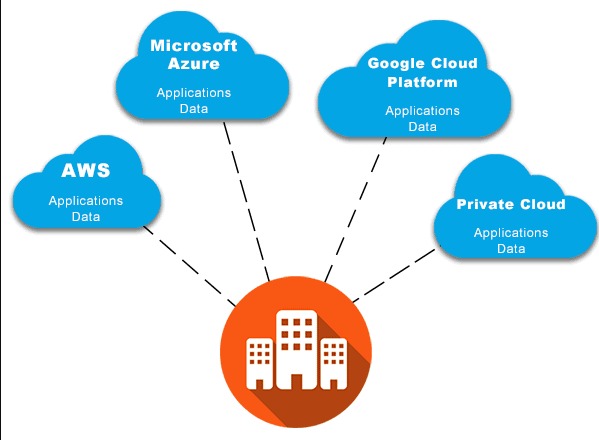Before attempting to answer the question, when does the private cloud make sense over the public cloud? We must first understand the cloud and you must get high end cloud computing consulting services.
The cloud refers to the remote use of someone else’s (Cloud Service Provider) computing resources. These resources usually comprise one or more services, including storage, compute power, databases, email services, and other web functions. The resources are typically housed offsite and managed by a third party; users just access them using the internet.
Whether the servers are offered as a private cloud or a public cloud-primarily depends on how they are managed, who uses the servers, and how they use them:
Private Cloud:
The key defining factor for private cloud services is that the servers are dedicated to only one user or tenant and not open to users. You build a private cloud on-premise, using hardware maintained at your location or hosted utilising a provider’s data center.
You remain responsible for maintaining servers and managing performance and operational capacity (Broadband, electricity, cooling, etc.).
Public Cloud:
When you purchase public cloud services, you share servers with random tenants. Public cloud services are typically offered remotely by a vendor using co-located servers.
As a user, you only pay for the operating expenses and are not responsible for capital expenses. If your needs change, you can quickly scale up or down capacity on-demand.
When does the Private cloud make sense over the public cloud?
It’s pretty difficult to out-match cloud services for most business needs. The cloud makes the benefits of data center outsourcing more appealing by offering instant scalability and unlimited flexibility.
To deploy public or private cloud services largely depends on your business requirements.
So, when does the private cloud make sense over the public cloud? The public cloud provides instant scalability but offers less security because the resources are pooled together and open to the “public.” However, the private cloud provides better security but requires more resources and time to deploy.
Look For EES
Understanding how the two types of clouds work is imperative to determine which solution is most fit for your business. You can make this process easier by seeking the advice of professional cloud service consultants, like Enterprise Engineering Solutions, to help you break down crucial factors such as costs, accessibility, reliability, and scalability.
You can get a tailored solution to meet your business requirements, operations, regulations, budget, and future forecasts.
Thankfully, there are varieties of choices to accommodate any budget and use case. Regardless of your choice of deployment, EES offers custom cloud services and solutions tailored to meet your specific business needs. If you’d like a comprehensive illustration to learn more about cloud services can help your business move forward, reach out to us, and we are more than glad to help you with cloud management services.
Advantages and Disadvantages Of Private Cloud Services
Of course, every kind of technology has its pros and cons. The private cloud is ideal for industries with sensitive requirements such as government, defense, financial institutions, and businesses that manage data-intensive customers within highly security-conscious enterprises.
Advantages of a Private Cloud
High Security:
The private cloud offers enhanced protection because organizations can physically manage and secure their servers. It also allows users to access and share data resources using a private network.
Lower Latency:
Managing your data using on-premise private cloud services increases service speed and decreases latency since resources are located and dedicated to specific.
Disadvantages of a Private Cloud
Limited Scalability:
With the private cloud, you may have to accept scalability limitations because it might be challenging to increase the operational capacity of a private cloud on-demand.
Cost:
Typically, private cloud solutions have higher up-front fees, in contrast to the public cloud.
Advantages and Disadvantages Of Public Cloud Services
The public cloud also has its advantages and disadvantages. Understanding this will help you determine if a public cloud is a suitable solution for your business requirements.
Public Cloud Storage Advantages
Subscription Based:
Instead of building an actual data center with significant up-front costs, you can purchase public cloud services at a lower monthly price.
Quick Deployment:
Public cloud services are built for easy implementation and are easy to deploy, on-demand.
Comprehensive Incentives:
Public cloud services offer incentives like free trials and free tiers subscriptions that make their solutions more appealing.
Scalability and Speed:
The public cloud offers on-demand scalability and fast time to market because it allows you to spread infrastructure costs across many customers at the click of a button. Thats why you must go with the cloud infrastructure managed services.
Public Cloud Storage Disadvantages
Security Limitations:
Some organizations, such as defense contractors, government institutions and banks, may need enhanced security for data protection. Satisfying such security demands is easier for private cloud services.
Latency:
Because the public cloud is open to the “public,” it may cause some latency, even if it’s in small amounts; it may cause some performance problems for organizations that require zero-latency when sending or retrieving data from the cloud.
Final Words
In contrast to public cloud services, the private cloud offers organizations enhanced security by allowing you to maintain complete control over all the data center resources. However, this increased security may only be enjoyed at the expense of instant scalability.
Apart from the few industries with special needs, the public cloud is often an excellent option. Contact our experts at EES to get a comprehensive overview of which cloud computing consulting services will be best for your business operations.

